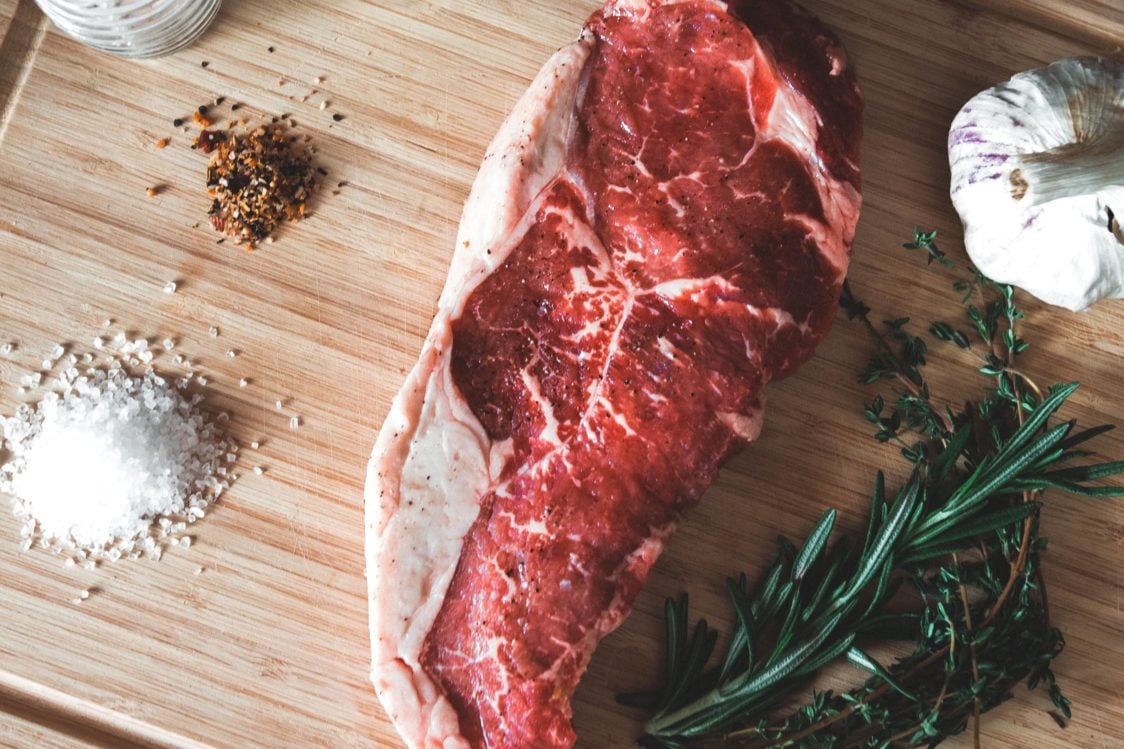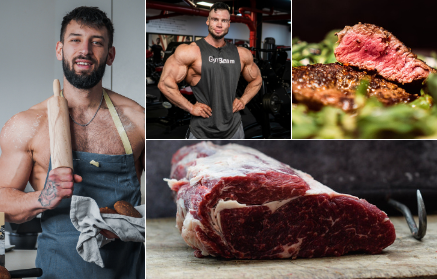Table of Contents
Many people cannot image their diet without red meat. Under this term we can find beef, pork, veal or lamb. First of all, it is an excellent source of high-quality protein, which forms the basis for building muscle. At the same time, it also contains vitamin B12, zinc and iron, necessary for the production of hemoglobin and myoglobin, i.e. oxygen carriers from the lungs to important organs and muscles.
Another important component is zinc, which is responsible for normal testosterone levels in the blood, healthy skin, hair and nails. It also takes care of the proper functioning of metabolism, digestion, growth and development. [1]
Red meat is very nutritious. One 100g portion of lean beef roughly contains [15]:
- 247 calories
- 19.07 g fat
- 17.44 g protein
- 1.97 mg iron
- 274 mg potassium
- 4.23 mg zinc
- 2.15 mg vitamin B12
However, its nutritional value is affected by many factors, such as the specific type of meat, processing, animal’s diet, breeding, age or even sex. Recently, red meat has been the subject of various controversial theories. Many of them talk about the negative effects on our health.
Processed vs. unprocessed meat
When assessing the impact on human health, most research recognises the difference between processed and unprocessed meat.
- Processed meat are the products that have undergone preservation methods or other processes aimed at improving their shelf life and taste (adding salt or preservatives, smoking, etc.). In reality, these are various products, such as salami, ham, frankfurters, sausages, pâté or canned meat.
- The group of unprocessed red meat includes mainly the muscle mass of mammals, like beef, veal, lamb, pork or venison. So, these are pieces of meat that we buy from a butcher in the raw state to prepare it at home. [4]
When it comes to nutrients, unprocessed and processed meat are different. Due to industrial processing, processed meat typically has a higher energy value and at the same time a higher fat content, but it can also have less protein. However, the biggest nutritional difference is the use of salt and preservatives. The processed meat contains up to four times more of them. Excess of these raw materials, along with saturated fats, is one of the most common causes of health problems. [4]

Consumption of red meat, according to several studies, has a negative impact on human health, indicating in particular a higher risk associated with [2]:
- the development and mortality of cancer [2] [12]
- the development of diabetes
- kidney and digestive problems
- colorectal, prostate and pancreatic cancer
The World Cancer Research Fund (WCRF) does not recommend more than 350-500g of red meat per week. Nutritional recommendations from the UK talk about a maximum of 70g per day. The Irish recommend consuming lean red meat only 2 to 3 days a week. [3]
Risks of cardiovascular diseases
Relevant sources refer to scientific studies that have examined red meat intake and its relation to cardiovascular risks, cancer and subsequent mortality. Although scientists have spent years on this problem, the results are mixed. [5]
Most of the available studies state that the key to how our health is affected by red meat is its specific type and processing. Processed red meat, especially bacon, sausages, frankfurters or salami, can pose high health risks. [6]

On the other hand, unprocessed lean pieces of steak, sirloin or pork tenderloin are usually healthier. This is mainly because those are not highly industrially processed foods. They do not contain excessive amount of salt, fat or preservatives. For years, scientists have believed that the consumption of red meat and its connection with cardiovascular problems are mainly due to saturated fats, the effect of cholesterol and excess salt. [16]
This is what the claims of the American Heart Association (AHA) are based on. They claim that a large amount of saturated fat can increase the level of cholesterol in blood. In connection with that, there is also an increased risk of heart disease. The AHA recommends that people limit the amount of red meat and encourages higher consumption of lean meat or beans. [10]
Legumes, in particular, are a good alternative source of protein that can be more beneficial to the heart. As an example, we can mention black-eyed pea (23.5 g protein / 100 g), peas (23 g protein / 100 g) or chickpeas (19 g protein / 100 g).
You might be interested in these products:
(Un)certain studies on cancer risks
Some research studies suggest that regular consumption of red meat may increase the risk of cancer and mortality associated with it. However, scientists differ in this regard. The World Health Organization (WHO) claims that red and processed meat can be carcinogenic to humans. It classifies it into group 2A, which talks about probably carcinogenic substances. In the same group are, for example, anabolic steroids or ethyl carbamate, also known as urethane. [7] [11-13]
They refer to several large studies. According to them, people eating more red meat were more likely to be prone to colon, pancreatic and prostate cancer. Processed meat, which has also been linked to stomach cancer, posed even higher risk.
One survey followed more than 42,000 women over seven years. It found that higher consumption of red meat (processed and unprocessed) was associated with a higher risk of breast cancer. In contrast, women who ate poultry during the study period had a lower risk. [8]
Another large study focused on mortality. It went over 10 years and followed a sample of 120,000 men and women. The researchers concluded that only participants who ate processed red meat were associated with a higher risk of death. [7]
Dietitian Renata Micha and her colleagues at Harvard gathered information from 20 completed studies. They contain data from 1.2 million participants, of whom 27,000 became ill with heart disease, diabetes or stroke. These studies followed people over a long period of their lives. They specifically observed the development of their health status related to meat consumption. [4]
The key findings of the research were:
- Red meat may not be as bad for your heart as some studies have suggested
- People who ate one serving of unprocessed red meat a day did not suffer more from heart diseases than those who ate meat just rarely
- Daily consumption of processed red meat, such as bacon or sausages, increased the risk of heart disease by 42% and diabetes by 19%
- The differences between processed and unprocessed red meat are key in the evaluation of research
- Every 100 g of red meat a day is associated with an increased risk of colon cancer by 22%
On the other side of the spectrum, there are whole grain foods. Daily consumption of 90 g of whole grains reduces the risk of colon cancer by 18%. The intake of vegetables, fruits, and fish have a positive effect in this regard. That’s why it’s important to look at your diet comprehensively. You should see it as a whole, not as isolated components. [14]
What to remember from the topic of red meat?
A clear conclusion could be summed up by a well-known rule – too much of anything is bad. It is not easy to confirm that red meat or any other food can be a health risk for humans. This is mainly because many factors play a role in the development of any particular disease. Genetics, lifestyle, diet composition, level of physical activity, quality of sleep, environment, stress levels and other things affect diseases and their development.
It would be practically impossible to do a research which would take all these aspects into account for each participant. There is a lot of general data, such as that lower consumption of red meat could have caused 10 fewer cases of diabetes for every 1,000 people. However, no study at the individual level can say whether you would be one of these cases.

The preparation of the meat itself is also important in this regard. If done wrong, meat can produce harmful heterocyclic amines (HCAs) or polycyclic aromatic hydrocarbons (PAHs). These are chemicals that are formed during high temperatures when preparing beef, pork, fish and poultry, for example by frying or grilling. Laboratory tests showed that HCAs and PAHs are carcinogenic and mutagenic.
This means that they cause changes in the DNA that can lead to an increased risk of cancer. HCAs are formed from the reaction of amino acids, sugars and creatine to high temperatures. PAHs are found in smoke, which is formed when fat or meat juice drips onto the surface beneath it and then evaporates (e.g. by grilling or smoking). [9] [11]
There are a few tips to follow when preparing meals:
- Instead of grilling and frying, choose a more gentle way of preparation, such as stewing or steaming
- Minimize preparation at high temperatures and never expose meat to direct flames
- Do not eat burned meat
- Marinating in garlic, red wine, lemon juice or olive oil can significantly reduce the amount of heterocyclic amines
- If you have to prepare the meat at a high temperature, flip it often so that it does not burn
- When grilling, do not cook the meat too much, as this increases the level of toxic substances
- Try to cut off excess fat from the meat and use only the necessary amount of oil
Eating red meat may or may not affect your health. In this respect, your overall diet needs to be monitored more closely. A balanced diet rich in nutrients and antioxidants is highly recommended, as it contains the most natural and least industrially added substances. Therefore, you should eat more vegetables, fruits and less fast food or sweets. If you are looking for a suitable source of protein, you can definitely reach for poultry, fish and legumes. On the contrary, you should avoid heavily processed foods such as salami, pâtés and the like. A much better choice will be, for example, a well-prepared steak with a good portion of vegetables or baked potatoes.
Do you consume red meat? Do you make sure that your diet is balanced enough? Share your opinions with us in the comments. If you liked the article, don’t forget to share it with your friends and colleagues.
[1] Kleiner Susan – Fitness výživa (2010)
[2] Robin W.M. Vernooij, PhD, Dena Zeraatkar, MSc, Mi Ah Han, MD, PhD, Regina El Dib, PhD, Max Zworth, BA&Sc, Kirolos Milio, BSc, Daegan Sit, MD, Yung Lee, BHSc, Huda Gomaa, MSc – Patterns of Red and Processed Meat Consumption and Risk for Cardiometabolic and Cancer Outcomes – https://www.acpjournals.org/doi/10.7326/M19-1583
[3] Alan Flanagan – Red Meat & Human Health – https://sigmanutrition.com/red-meat/
[4] Red meat: Avoid the processed stuff – https://www.health.harvard.edu/newsletter_article/red-meat-avoid-the-processed-stuff
[5] Michael Hull – Headline Whiplash: Red meat is good for you now? – https://examine.com/nutrition/red-meat-is-good-for-you-now/#ref5
[6] Piet A. van den Brandt – Red meat, processed meat, and other dietary protein sources and risk of overall and cause-specific mortality in The Netherlands Cohort Study – https://link.springer.com/article/10.1007/s10654-019-00483-9
[7] Red meat and processed meat – https://monographs.iarc.fr/wp-content/uploads/2018/06/mono114.pdf
[8] Jamie J. Lo Yong‐Moon Mark Park Rashmi Sinha Dale P. Sandler – Association between meat consumption and risk of breast cancer: Findings from the Sister Study – https://onlinelibrary.wiley.com/doi/epdf/10.1002/ijc.32547?referrer_access_token=64TM7qJaxgBD0DtkcRNC3E4keas67K9QMdWULTWMo8PZUA4u_nTPOa1ybeEU_KQpisJ9yZq2GnHNxRoh0Y0mnxySGykWEwhG43-tLUNpZr808SN8c3skoFuNi-FNzol-PozuUTN3P1C4Pax4-UAzOQ%3D%3D
[9] How to Make Your Meat as Healthy as Possible – https://www.healthline.com/nutrition/how-to-make-your-meat-as-healthy-as-possible
[10] Meat, Poultry, and Fish: Picking Healthy Proteins – https://www.heart.org/en/healthy-living/healthy-eating/eat-smart/nutrition-basics/meat-poultry-and-fish-picking-healthy-proteins
[11] Cross AJ, Sinha R. – Meat-related mutagens/carcinogens in the etiology of colorectal cancer – https://pubmed.ncbi.nlm.nih.gov/15199546/
[12] Cancer: Carcinogenicity of the consumption of red meat and processed meat – https://www.who.int/news-room/q-a-detail/cancer-carcinogenicity-of-the-consumption-of-red-meat-and-processed-meat
[13] IARC MONOGRAPHS ON THE IDENTIFICATION OF CARCINOGENIC HAZARDS TO HUMANS FR – https://monographs.iarc.who.int/list-of-classifications
[14] A R Vieira, L Abar, D S M Chan, S Vingeliene, E Polemiti, C Stevens , D Greenwood, T Norat – Foods and beverages and colorectal cancer risk: a systematic review and meta-analysis of cohort studies, an update of the evidence of the WCRF-AICR Continuous Update Project – https://pubmed.ncbi.nlm.nih.gov/28407090/
[15] Jennifer Berry – Is red meat bad for your health? – https://www.medicalnewstoday.com/articles/326156
[16] Francesco P Cappuccio – Cardiovascular and other effects of salt consumption – https://www.ncbi.nlm.nih.gov/pmc/articles/PMC4089690/

